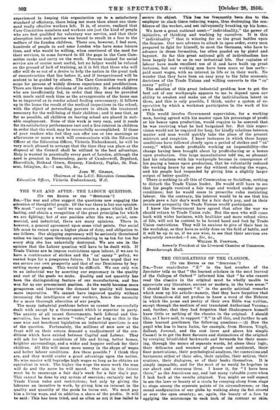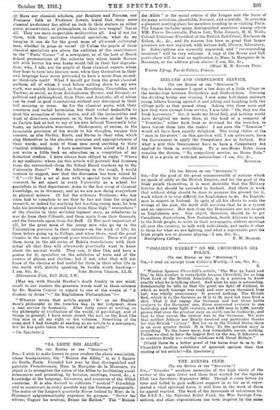THE CONSOLATIONS OF THE CLASSICS., ET° TEE Burros or ran
" SPECTATOR.")
Sni,—Your. contributor " S." in the last number of the . Spectator tells us that " the learned scholars in the most learned' of the Colleges of Oxford " informed him that " he who' cannot read' the classics in the original must be wholly, unable to appreciate any literature, ancient or modern, in the true-sense." I should like to support " S." in the gently satirical remarks which sum up his article—namely, that they have forgotten thab they themselves did not profess to know a. word of the Hebrew; in which the prose and poetry of their own Bible was written,, except through the medium of our translated Authorized Version; and, further, that they had forgotten that Shakespeare himself knew little or nothing of the classics in the original. I should like, as I have said, to support " S." in all this, and further to ask these learned gentlemen the following questions :—(1) How tha pupil who has to learn Latin, for example, from Horace, Virgil,, Sallust, Juvenal, and the rest (over and .above his simple, Caesar) is to get the finer, flavours and distinctions of the original; by creeping blindfolded backwards and forwards for their mean* big, through the mazes of separate words, let alone their logic, their delicacies and nuances of phrase and sentiment, their finer penetrations, their psychological analyses, the connexions.nd, harmonies either of their odes, their epistles, their satires, their orations, their dialogues, or of their books themselves. It is simply impossible, and' for the most of us would be hopeless in our short and strenuous lives. I know it, for "I have been there," as the Americans say, and lost many valuable years when I look back at the results- attained. You might as well expect to see the laws or beauty of a circle by creeping along from stage to stage among the separate points of its circumference; or they round configuration of our globe by walking along its flat streets or over the• open country; or, again, the beauty of a face by applying, the microscope -to each inch. of its contour or skin. (2) Have our classical scholars, tau Bentleys and Parsons, our Professor Jebb or Professor Jewett, found that their mere! classical proficiency has added an inch to their stature as either .poets, press:writers, or philosophers, in their own tongue? Not at • all. They are mere respectable mediocrities all. And if not for ithem, with their exclusive classical specialism. what do we, imagine it can do for the great mass of all-round cultivated men, whether in prose or verse? (3) Unless the pupils of these classical specialists are above the ambition of the contributors to the "Poets' Corner " of a newspaper, or of the host of Board • School grammarians of the suburbs into whose hands Horace felt with horror his own books would fall in their last degrada- tion; who, I ask, are the pupils of these classical experts whom they hope to turn into literary men, when they themselves in their own language have never pretended to have a more than second- or third-rate rank? What I myself got from the great classical authors, all of whom I read before settling down to my own work, was mainly historical, as from Herodotus, Thucydides, and Tacitus; or social, as from Aristophanee, Horace, and Juvenal; or political and philosophical, from Plato and Aristotle; all of whom -can be read in good translations without any detriment to their `full• meaning or sense. As for the classical poets, with their sweetness and verbal harmonies, but their verbal makeshifts to meet the necessities of their metre, and all the insincerities and want of directness consequent on it, they became at last to me, ns Carlyle had at lilt to say of his own beloved Tennyson's later -books, an intolerable weariness. Shakespeare, of course, in the invariable „precision of his words to his thoughts, escapes this censure, as also Shelley, Keats, and Burns in their odes, which sing themselves in the absolute precision and appropriateness of 'their words; and none of these men owed anything to their classical scholarship. I have sometimes been asked why I did net write a little book on education as a completion of my historical studies. I have always been obliged to reply, " Where is my audience; where (as-this article will portend) find listeners from the entrenched—from the School Board tearhers up-to the University Dons?" But the following in the rough, I would venture to suggest, now that the discussion has been raised by " S.":—(1) Let a set of men with a special turn for classical research be set apart in every University as a school for -specialists in that department, down to the last scrap of classical .knowledge, as in Germany, and as we are now doing everywhere in physical science. (2) Let the ordinary Professor, who has
• often had to complain to me that he has not time for original research, or indeed for anythiug but teaching young men; let him take his knowledge at second hand from these high " researchers " of the classics in their secluded topmost story, as subalterns in war do from their Colonels, and these again from their Generals, • and the Generals again from the Staff. (3) But most important of all, let the great mass of the young .men who go up to the Universities previous to their entrance on the work of life; let them before going up to College, and when there, read the great classics in the most approved prose translations. These will give them (even in the old series of Bohn.'s translations, with their notes) all that they will afterwards practically want to know about the ancient world. They can, if they like, and have a genius for it, specialize on the subtleties of texts and of the nuance of phrase and rhythm; but if not, what they will not know of the classics or find useful for them in their after life in the world will, strictly speaking, be hardly worth knowing.—
[May we, with Donald Hankey's death freshly in our mind, recall to our readers the generous words used in these columns by Dr. Beattie Crozier in regard to one of the essays of " A Student in Arms "—" An Englishman Philosophizes "?—
" Whoever wrote that article signed ' D.' on an English- man's philosophy in the trenches has, in my judgment, done a real service to humanity. After forty years of writing on 4he philosophy of civilization of the world, of psychology, and of things in general, I have never struck the nail on the head like this man in all my eight or ten volumes. Something of the %same-sort I had thought of sending as an article to a newspaper, but he has quite taken the wind out of any sails."
—ED. Spectator.]



































 Previous page
Previous page